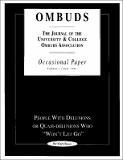| dc.contributor.author | Rowe, Mary | |
| dc.date.accessioned | 2024-08-08T22:59:08Z | |
| dc.date.available | 2024-08-08T22:59:08Z | |
| dc.date.issued | 1994 | |
| dc.identifier.uri | https://hdl.handle.net/1721.1/155966 | |
| dc.description.abstract | In recent years an increasing number of otherwise productive people, who appear to have delusions or quasi-delusions and who "won't let go," have come to the attention of workplace and university complaint handlers. These are people who have ideas which appear contrary to fact, and who, in addition, seem obsessed about these ideas. Complaint handlers come to hear about this sub-group of obsessed people with delusions or quasi-delusions in two ways. People with obsessive delusions may come in as complainants, and then continuously refuse to settle or give up the complaint. This may be true even after a court has ruled against them. Or they may be reported to the complaint handler as harassers when they follow, skulk, stalk, scare or anger others, and apparently cannot be persuaded to give up the object of their interest.
There has been little published in the human resource or dispute resolution literature about otherwise productive
persons who present in workplace or academic settings as both obsessed and quasi-delusional. In this article, the author sketches out characteristics of a specific group of people who have some obsessive beliefs and ideas that appear not to be based in reality. She suggests some ways individual complaint handlers and organizations may deal with questions and concerns posed by such persons. | en_US |
| dc.language.iso | en_US | en_US |
| dc.publisher | Journal of the University and College Ombuds Association | en_US |
| dc.subject | complaint handling, complainants, harassers, employees with delusions, employees with quasi-delusions | en_US |
| dc.title | People with Delusions or Quasi-Delusions Who "Won't Let Go" | en_US |
| dc.type | Article | en_US |
| dc.identifier.citation | Mary Rowe, “People with Delusions or Quasi-Delusions Who ‘Won't Let Go,’” Journal of the University and College Ombuds Association, Occasional Paper, Number 1 (Fall 1994). | en_US |
